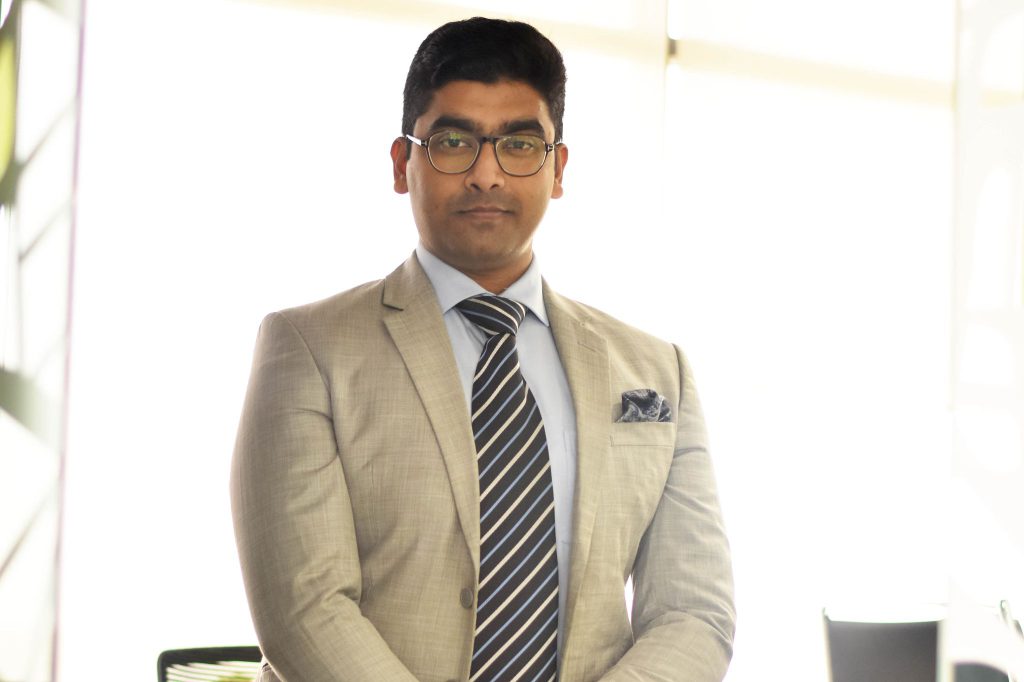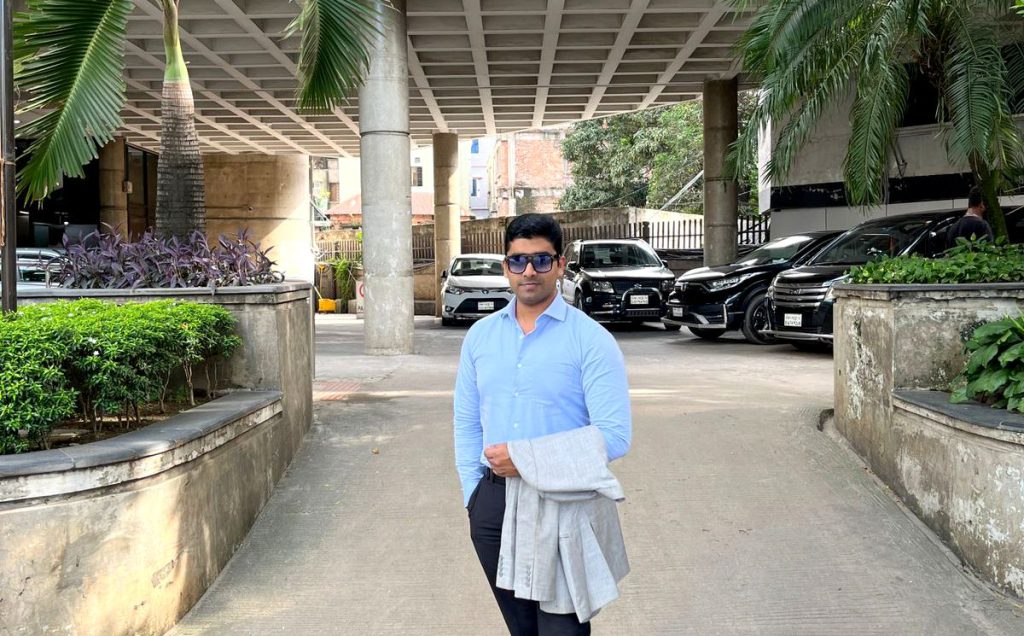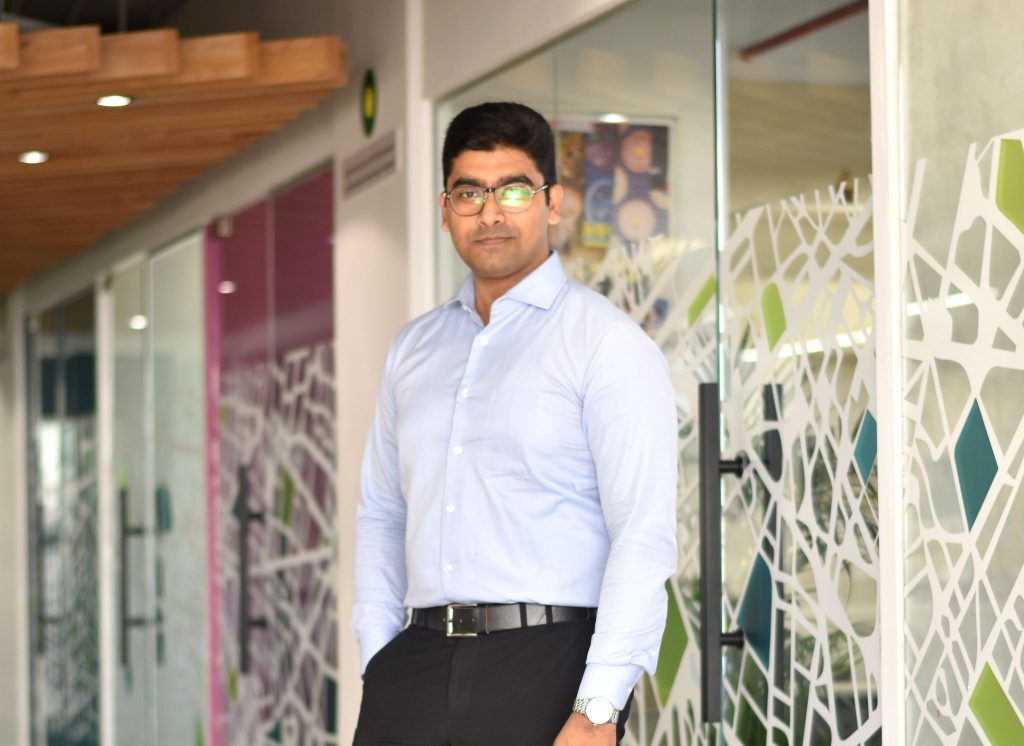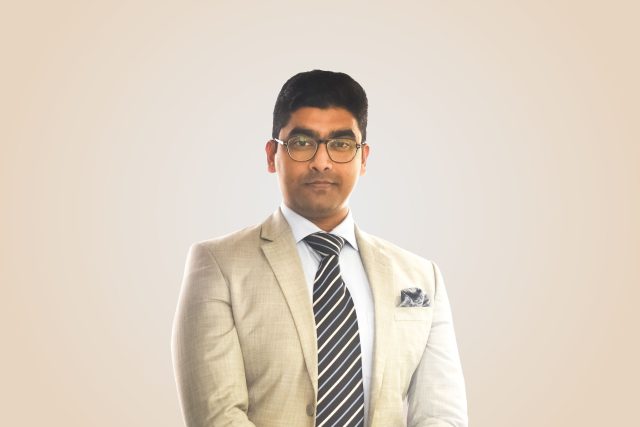Mohammed Farhan Basher
Manager, Learning and Development, HRD
BRAC International
Mr. Mohammed Farhan Basher is a dedicated leader in the field of Learning and Development. As the Manager of Learning and Development within BRAC International’s HRD division, Mr. Farhan brings a wealth of expertise and experience to empower individuals and organizations through education and growth initiatives. With a passion for cultivating talent and fostering a culture of continuous learning, Mr. Farhan is a driving force in BRAC International’s mission to create a positive and sustainable impact across the globe.
Let’s learn about his journey.
The InCAP: Mr. Mohammed Farhan Basher, please share your professional and academic peregrination for our readers!
Mr. Mohammed Farhan Basher: I am excited to share my humble journey with the InCAP team. In line with my academics, I am an alumnus of the University of London, UK, as I pursued legal studies at the university at the undergraduate level and completed my studies with a Mark of Credit in 2017. Before my undergraduate studies, I had completed my GCE A Level from Maple Leaf International School, Dhaka, and GCE O Level from Mastermind School, Dhaka.
Currently, I am performing in the capacity of a Manager for Learning and Development (L&D) under the Human Resources Division (HRD) at the international section of the #1 and the largest non-governmental organization (NGO) in the world – BRAC (BRAC International).
My work experience spans over 05 years now. I started with 02 full-time internships back-to-back at Syed Ishtiaq Ahmed & Associates (SIA&A) and Accord Chambers respectively in 2017, both being top-tier Dhaka-based corporate law firms. My internship at both firms prepared the groundwork for me to full-fledgedly enter the workforce as an aspiring professional.
In 2018, I joined full-time service as a Faculty Member in the English Department at Wordbridge School, an IGCSE school based in Dhanmondi R/A, Dhaka – a sister concern of Younus Group. It was at this job that I discovered that I had a knack for teaching and training. I felt teaching and/or training came quite naturally to me. I didn’t have to be groomed much for it. It felt as if I was gifted with the skill of imparting lessons. I taught middle to senior classes at the school and became a favourite among my students.
During the same time when I was teaching at Wordbridge, I came across another part-time offer to impart business communication training to certain members of staff at KFW’s Dhaka office in Banani. Without further ado, I grabbed the opportunity as I realized that this would only further hone my teaching and training skills alongside extending me much-needed exposure to the commercial side of the world – KFW is one of the largest investment and development banks in the world. On those days, I would halve my workday into 02 slots – in the first half, I would be teaching at the school, and in the second half, I would be sharing my time with KFW – providing business communication training to a number of its staff members. By the time I would retire to home, I would be completely depleted. But in any case, I believed and I knew that all the hard work would only return favours to me. So, I remained resolved to do as best as I could.
I had just completed one academic year of my tenure at Wordbridge School in 2019 when I came upon an exciting opportunity at Augmedix Bangladesh Limited, a Silicon Valley-based healthcare technology company. Currently, Augmedix is a public top 100 healthcare technology company as per the Healthcare Technology Report, but in 2019, it was a startup only starting to gain traction. I joined as an L&D Associate and worked my way through 03 promotions – the latter two were conferred upon me as a double promotion, which landed me in the role of Lead for L&D. In my four years of experience at Augmedix, I offered first-hand Medical Documentation Specialist (MDS) training to 500+ individuals – all coming from diverse academic backgrounds. Such manifold academic backgrounds of trainees at Augmedix was the biggest challenge for me and my team, as we had to constantly look for ways to accommodate them all and ultimately transition each to a trained MDS where s/he possessed flawless written English grammar skills, over 60 words per minute of typing speed, and uncompromised Langauge of Medicine (LoM) skills.
Besides the niche MDS training, I was also responsible for walking the trainees through corporate compliance, HR, harassment mitigation, and labor law policies. Alongside, I performed as one of Augmedix’s social media spokespersons, as I engaged with 10,000+ members of Augmedix’s social media audience who routinely followed Augmedix’s social media feeds. I covered four seasons of live English grammar classes on Facebook and YouTube, totaling 40 01-hour episodes. These live social media engagements added massively to the tally of MDS applications, and at the moment, Augmedix has a team of 1,500+ employees across the United States of America, India, Bangladesh, and Sri Lanka.
I was bestowed 03 Beast awards, special employee performance recognition awards, for consistently exceeding my targets. I would say much of my professional character was built at Augmedix for which I am ever grateful to every single person I worked with at Augmedix, my team, and the senior management. I also take great pride in the fact that I have been a member of the team at Augmedix that built the organization from the ground up, especially seeing through the transition from a small startup to a considerably sizeable public company.
Earlier this year, I was reached out by the recruitment team at BRAC International (BI) in response to my application for the position of Manager for Learning and Development at BI. I soon followed through 06 stages of the recruitment process before I was handed my appointment letter. I joined BI in May 2023, and so far, it has been a dream ride for me.
Can you provide an overview of your role and responsibilities as Manager of Learning and Development at BRAC International?
As a Manager for Learning and Development (L&D) at BRAC International (BI), in simple words, I am primarily responsible for introducing and running highly effective learning interventions and solutions for all BI staff across 16 countries across Asia and Africa and 03 other offices in the Netherlands, the UK, and the USA.

As we speak, my team and I are now laying the groundwork for an exceptionally impactful learning management system (LMS) that will address and cover almost all the intricacies of an L&D-focused, forward-looking, 21st-century global organization. I partner with country L&D First Persons Responsible (FPRs), HR Heads, and Country Directors to scrutinize country learning needs and roll out learning initiatives and plans accordingly. One of the extraordinary operational privileges of this role is frequent international travel and exposure. Such exposure would only catapult my experience and insights into the international developmental landscape and infrastructure. I am also responsible for designing and delivering capacity-building initiatives, modifying and running orientation programs, conducting training of trainers (TOTs), coordinating high-level delegate visits, and seeing through safeguarding measures within my capacity.
What strategies have you implemented to ensure alignment between employee development and organizational goals at BRAC International?
Ensuring alignment between employee development and organizational goals is one of the more crucial goals at BI for its overall success and growth as a global leader in the development sector. Here are some strategies my team and I are presently working on to implement:
- Clear Communication of Goals:
We are setting clear and articulate standards of communication regarding organization goals and objectives for all BI staff, making sure everyone understands our mission, vision, and strategic priorities. - Individual Development Plans (IDPs):
We are closely working with our staff to create Individual Development Plans that align with their personal career goals and BI’s objectives. This includes skills development, certifications, and career milestones. - Skill Gap Analysis:
We run regular assessments to identify gaps in skills and competencies required to achieve BI goals. We use the information to design targeted capacity-building initiatives. - Mentoring and Coaching:
We create opportunities for employees to be mentored or coached by experienced colleagues or managers. This is a powerful way to transfer knowledge and skills aligned with our organizational objectives. - Feedback Loops:
We have channels for our team members to provide feedback on the L&D programs and initiatives offered. We use the feedback to refine and improve our services over time. - Lead by Example:
We routinely encourage our senior leadership to model the behaviour and skills expected of our team members. This demonstrates our commitment to our goals and encourages everyone to follow suit.
By implementing these strategies, we create a more aligned and motivated workforce, which in turn contributes to the achievement of our developmental goals. We always keep in mind that ongoing communication and flexibility are key to successfully managing employee development in line with our organizational objectives.
Mr. Basher, could you share a successful case where your team’s training and development initiatives directly contributed to improved employee performance or company outcomes?
I can share such a case from my tenure at Augmedix. The Medical Documentation Specialist (MDS) training has 02 phases. Trainees need to graduate from Phases 01 to 02 by meeting training KPIs set in the first phase and eventually clearing an industry-standard test at the end of Phase 01. Once, a full cohort of trainees failed to clear the final assessment at the end of Phase 01 and were barred automatically from graduating to Phase 02 of the training program. My team was principally responsible for imparting training in Phase 01. Also, the entire training program was time-sensitive, and we needed to ensure that there could be no performance attrition. Therefore, we had only about a week to remedy the crisis and transition the cohort to the second phase to meet the program deadline.
I immediately underwent some investigation and learned that the primary training resource’s lack of sufficient experience had led to the failure of the cohort. I personally took charge of the assignment of remediation of the cohort’s failure. For the following 07 working days, I conducted the following:
- Day-long retraining sessions as a refresher of the entire Phase 01 program for each trainee
- One-on-one feedback session with each trainee to address his or her mistakes at length
- Reiteration of the most essential components of the program to close any loopholes
As a result of my direct initiatives, the cohort eventually cleared the Phase 01 final assessment with distinction to the extent that until then the cohort score average had turned out to be the highest. The trainees continued to excel even better in the second phase of the training program and finally qualified as highly-trained MDSs supporting high-performing medical teams in the US. We were able to obtain optimum training ROI and incurred zero financial loss due to the earlier crisis. I was shortly conferred a Beast award for my timely decisions and astute performance.

What key performance indicators (KPIs) do you track to measure the success of your learning and development programs?
The KPIs I track closely to monitor the success of our learning and development interventions are as follows:
- Completion Rates:
We measure the percentage of our staff who successfully complete the training program. This hints at the staff’s engagement and commitment to learning. - Time to Competency:
We monitor the time it takes for an employee to become proficient in a new skill or task after completing a given training program. This indicates how quickly the learning is being applied in the workplace. - Employee Feedback and Satisfaction:
We gather feedback from participants to assess their satisfaction with the training content, delivery, and overall experience. This is done through surveys or focus groups. - Manager Feedback and Support:
We obtain feedback from managers on the performance improvements they observe in their team members after our training programs. This provides insight into the programs’ impact on job performance. - Return on Investment (ROI):
We calculate the financial impact of the training program by comparing the costs of implementation to the benefits gained, such as increased productivity, cost savings, or revenue growth. - Impact on Business Goals:
Finally, we assess the extent to which a given training program contributes to achieving specific business objectives, such as an increased number of benefactors, improved beneficiary satisfaction, or reduced error rates.
How do you tailor training programs to meet the diverse needs of BRAC International’s global workforce?
Tailoring training programs to meet the diverse needs of BRAC International’s global workforce requires innovative and inclusive approaches. BRAC is older and larger than many Fortune 500 companies, such as Apple, Google, Microsoft, or Amazon; the NGO operates in multiple countries and continents with varying cultures, languages, and work environments. We keep close to our hearts 04 values taught to us by our founder, the Late Sir Fazle Hasan Abed, KCMG: Inclusiveness, Innovation, Effectiveness, and Integrity, as we map out our strategies to address the diversity:
- Cultural Sensitivity and Awareness:
We always try our best to stay on top of cultural sensitivity. We try to understand and respect cultural differences to create an inclusive learning environment. - Localized Case Studies and Examples:
We use case studies and examples that are relevant to each region or country of operation. This helps employees relate to the content and see its applicability in their context. - Inclusive Delivery Methods:
We offer a variety of training formats, including in-person workshops, virtual sessions, webinars, and self-paced e-learning courses. This accommodates different learning preferences and accessibility needs. - Accessibility Considerations:
We ensure that training materials and platforms are accessible to employees with disabilities. We also provide accommodations as needed, such as screen readers or subtitles. - Peer Learning and Communities of Practice:
We facilitate peer-to-peer learning and create communities of practice where employees can share knowledge, experiences, and best practices across regions. - Leadership Development and Succession Planning:
We design leadership development programs that take into account the diverse leadership styles and expectations in different regions.
By driving these strategies, we work to create more inclusive and effective training programs that cater to the diverse needs of our global workforce. This approach not only enhances skills and knowledge but also strengthens unity and collaboration across regions.
In your view, what are the most critical skills or competencies that employees should develop to thrive in today’s evolving business landscape, and how is BRAC International addressing this in its L&D programs?
In today’s rapidly evolving business landscape, employees need a combination of technical and soft skills to thrive. Here are some critical skills and competencies my team and I at BRAC International are working on to address in our Learning and Development (L&D) interventions:
- Digital Literacy and Tech Skills:
- Competencies: Proficiency in using digital tools, software, and emerging technologies.
- L&D Intervention: Offering courses and workshops on digital tools, cloud computing, data analytics, and other relevant technologies. Providing access to online resources and encouraging hands-on practice.
- Adaptability and Change Management:
- Competencies: Flexibility, resilience, and the ability to adapt to new processes.
- L&D Intervention: Conducting workshops on change management and agility and providing scenarios for employees to practice adapting to different situations. Inspiring a growth mindset.
- Critical Thinking and Problem-Solving:
- Competencies: Analytical thinking, problem-solving, and making data-driven decisions.
- L&D Interventions: Offering courses on problem-solving methodologies and data analysis, and encouraging employees to participate in cross-functional problem-solving exercises.
- Beneficiary-centricity:
- Competencies: Noting beneficiary needs, empathy, and providing excellent service.
- L&D Interventions: Designing client service training, conducting workshops on client empathy, and providing opportunities for employees to gather direct benefactor feedback.
- Cultural Intelligence and Global Perspective:
- Competencies: Acknowledging diverse cultures and working in a global context.
- L&D Interventions: Providing cultural sensitivity training, promoting diversity and inclusion initiatives, and encouraging cross-cultural experiences and exchanges.
- Ethics and Integrity:
- Competencies: Upholding ethical standards, transparency, and integrity throughout.
- L&D Interventions: Incorporating ethics training into the curriculum, providing case studies on ethical decision-making, and leading by example through ethical leadership.
We address these critical skills and competencies through a multifaceted approach in our L&D programs. This includes a combination of in-person and virtual workshops, e-learning modules, mentorship programs, access to external training resources, and opportunities for hands-on practice and application of skills. Additionally, regular assessments and feedback mechanisms help us track progress and identify areas for further development.

Quick Chat With Mohammed Farhan Basher
The most outstanding achievement of your life as of now:
As an achievement, I would say discovering my potential in Learning and Development and offering hands-on corporate training to over 500 people to date.
The greatest philosopher in your view:
Prophet Muhammad (peace be upon him)
Your Icon:
Warren Buffet
Name the most influential books you have read:
Hope over Fate by Scott Macmillan, The Coward’s Guide to Conflict by Tim Ursiny, and The Godfather by Mario Puzo
Your greatest fear:
Not being kind enough
Best piece of advice you’ve received:
To forgive and forget
You in only three words:
Agile learner, patient, and detail-oriented
Skill Set
- Hard Skills: Project Management, Communication, Critical Thinking, Microsoft Office, & Google Workspace
- Soft Skills: Leadership, Emotional Intelligence, Adaptability, Being Results-oriented, & Being Detail-oriented
Prayer For The Human Civilization:
One thing that is largely missing in my view of society today is empathy. I pray for all of humanity to become more empathetic not just toward one another but also towards all other stakeholders in the world, including animals and nature at large.
The InCAP: Thank you, Mr. Mohammed Farhan Basher! It’s a glittering conversation with you!
Mr. Mohammed Farhan Basher: My pleasure! Wish you all the best! Thank you.
To read more about Professional’s stories, Please Click Here!







